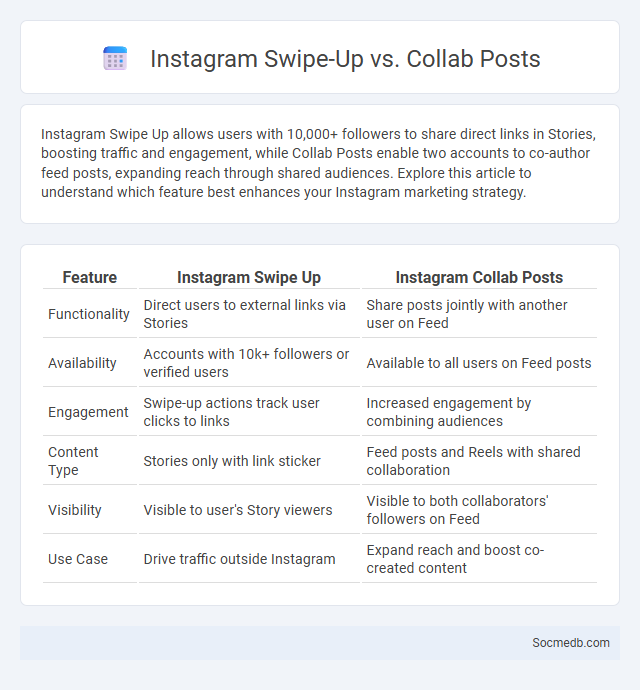
Photo illustration: Instagram Swipe Up vs Collab Posts
Instagram Swipe Up allows users with 10,000+ followers to share direct links in Stories, boosting traffic and engagement, while Collab Posts enable two accounts to co-author feed posts, expanding reach through shared audiences. Explore this article to understand which feature best enhances your Instagram marketing strategy.
Table of Comparison
| Feature | Instagram Swipe Up | Instagram Collab Posts |
|---|---|---|
| Functionality | Direct users to external links via Stories | Share posts jointly with another user on Feed |
| Availability | Accounts with 10k+ followers or verified users | Available to all users on Feed posts |
| Engagement | Swipe-up actions track user clicks to links | Increased engagement by combining audiences |
| Content Type | Stories only with link sticker | Feed posts and Reels with shared collaboration |
| Visibility | Visible to user's Story viewers | Visible to both collaborators' followers on Feed |
| Use Case | Drive traffic outside Instagram | Expand reach and boost co-created content |
Introduction to Instagram Swipe Up and Collab Posts
Instagram Swipe Up feature allows you to add direct links to your Stories, driving traffic to external websites, product pages, or content without users needing to leave the app. Collab Posts enable creators to co-author content, increasing reach and engagement by sharing the post with both audiences simultaneously. Using these features strategically can boost your brand visibility and enhance audience interaction on Instagram.
Swipe Up: What It Is and How It Works
Swipe Up is a popular social media feature that allows users to add a direct link to their Instagram Stories, enabling followers to access external websites instantly. This tool is primarily available for accounts with over 10,000 followers or verified users, enhancing your ability to drive traffic, promote products, or share content seamlessly. By incorporating Swipe Up, you can boost engagement and conversion rates, making it essential for effective digital marketing strategies.
Collab Posts: Definition and Key Features
Collab posts on social media are collaborative content pieces created jointly by two or more users, brands, or influencers, designed to reach wider audiences and boost engagement. These posts typically feature shared tagging, co-branded visuals, and synchronized publishing, maximizing visibility across followers of all collaborators. Key features include mutual audience exposure, combined creative efforts, and enhanced authenticity through genuine partnership representation.
Swipe Up vs Collab Posts: Core Differences
Swipe Up links on social media provide direct access to external websites, enhancing immediate user engagement and driving traffic efficiently. Collab Posts, on the other hand, involve co-created content shared simultaneously by multiple accounts, boosting reach and authenticity through combined audiences. Understanding these core differences helps you strategically choose the best format to maximize interaction and brand visibility.
Audience Engagement: Swipe Up vs Collab Posts
Audience engagement on social media significantly varies between Swipe Up links and Collab Posts. Swipe Up features drive direct traffic by providing instant access to external content, boosting click-through rates especially on Instagram Stories. Collab Posts enhance interaction and reach by co-creating content with other users, leveraging combined follower bases for increased likes, comments, and shares.
Conversion Rates and Click-Through Potential
Social media platforms significantly enhance conversion rates by targeting specific audience segments with personalized content and strategic call-to-actions. High-quality visuals combined with compelling copy increase click-through potential, driving traffic from posts to landing pages or product sites. Leveraging analytics tools allows marketers to optimize campaigns in real-time, maximizing both engagement and conversion efficiency across channels like Facebook, Instagram, and LinkedIn.
Accessibility and Eligibility Requirements
Social media platforms enhance accessibility by integrating features like alt text for images, voice recognition, and screen reader compatibility, enabling users with disabilities to engage effectively. Eligibility requirements often include age restrictions, typically set at 13 years or older, to comply with legal standards such as COPPA (Children's Online Privacy Protection Act). Accessibility and eligibility policies are continuously updated to address diverse user needs and ensure safe, inclusive digital environments.
Content Strategy: Which Feature to Use?
Choosing the right content strategy on social media depends on your target audience and platform-specific features like Instagram Stories, LinkedIn Articles, or TikTok videos. Utilizing these features effectively increases engagement by matching content format to user behavior and preferences. You should analyze performance metrics to refine your approach and ensure your content delivers maximum impact.
Best Practices for Swipe Up and Collab Posts
Maximize your social media engagement by using clear calls-to-action in Swipe Up links, ensuring they lead to relevant and mobile-friendly landing pages. For Collab posts, tag collaborators accurately, share authentic content, and engage with both audiences to boost visibility and trust. Your strategy should prioritize consistency, relevance, and interactive elements to optimize reach and conversions.
Conclusion: Choosing the Right Instagram Feature
Selecting the right Instagram feature depends on your content goals and audience engagement preferences. Stories offer real-time interaction, Reels boost reach with short-form videos, and Posts build a lasting visual narrative for your brand. Understanding these options ensures your Instagram strategy maximizes visibility and connects effectively with your followers.
 socmedb.com
socmedb.com